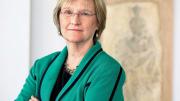One of the highlights of my spring semester is speaking with members of the senior class about their plans for the future. Some leave Harvard College in continuing pursuit of longstanding goals, and others depart with dreams they could not have predicted four years ago. This year, I had an opportunity to meet with the first cohort of Harvard Teacher Fellows, a select group of undergraduates who, through an innovative program at the Harvard Graduate School of Education (HGSE), are preparing to become secondary school teachers in communities most in need of high-quality instruction.
Our Fellows come from diverse backgrounds—a third are male, more than half are people of color, and together they represent fifteen concentrations—but they share a belief in the power of education and a commitment to changing individual lives through their work. Students of history spoke with me about their hope of making the past come alive in the classroom, and a young man described his deeply satisfying extracurricular work as a mentor and tutor as a springboard into the program. A mechanical engineering concentrator from Dallas was motivated, counterintuitive as it may seem, by a lackluster high school physics teacher who almost stifled her interests. She is energized to inspire young people to imagine making contributions to science, technology, engineering, and mathematics—no matter the hurdles they encounter.
At a moment when many of their classmates were beginning to imagine life after Harvard, these students were forging new bonds and becoming a tight-knit community, discovering common interests as they worked through “Introduction to Teaching and Learning in Schools,” a foundational course combining theoretical and empirical perspectives with on-the-ground observations in local schools. This summer they continue their education with intensive fieldwork and coursework in Cambridge before relocating to partner schools in Denver, New York, and Oakland. During the academic year, they will hold half-time teaching positions in mathematics, science, history, and English, receiving advice from mentors in their host cities and connecting with Harvard alumni already working in partner communities. These in-class and in-person experiences will be complemented by online courses in education, and the students will reconvene on campus after their teaching year to complete their fellowships.
Each of us can recall a teacher who transformed time in a classroom into endless opportunities to be curious and challenged, to find meaning and value in failure, to grow not just in knowledge but in wisdom. Yet the choice to enter the teaching profession at this moment can be complicated and fraught, especially for individuals who seek to educate children in high-need schools. Harvard must support young women and men who want to answer what HGSE Dean Jim Ryan has referred to as “the highest calling,” shaping the futures of girls and boys across the country through service as well-trained teachers. For this reason, Fellows are charged no tuition to participate in the program and receive stipends to help offset living expenses while on assignment, financial support that will make it possible for them to focus on their experience, their practice, and their students.
Teaching is a noble career choice and one of the ways in which Harvard can contribute to closing achievement gaps that forestall progress, reducing inequality not just through the students we admit, but also through the work they pursue throughout their lives. At last year’s Commencement, Dean Ryan applauded HGSE graduates for “learning to change the world through education in ways large and small” and “[beginning] to understand what it takes to fulfill the promise of diversity.” I recognize those same commitments in our first cohort of Harvard Teacher Fellows. They will bring all that they have learned at the University into the nation’s classrooms, and they have reinforced Harvard’s commitment to invigorating American education and fulfilling the promise of opportunity for all.








